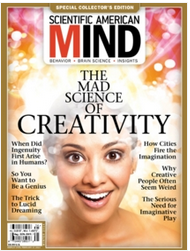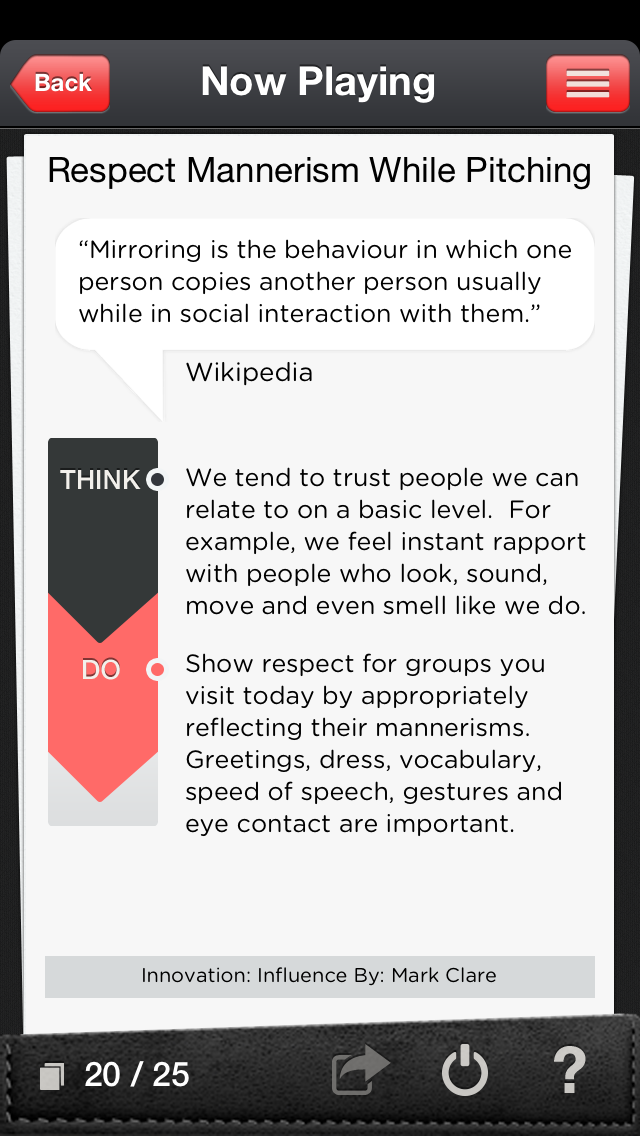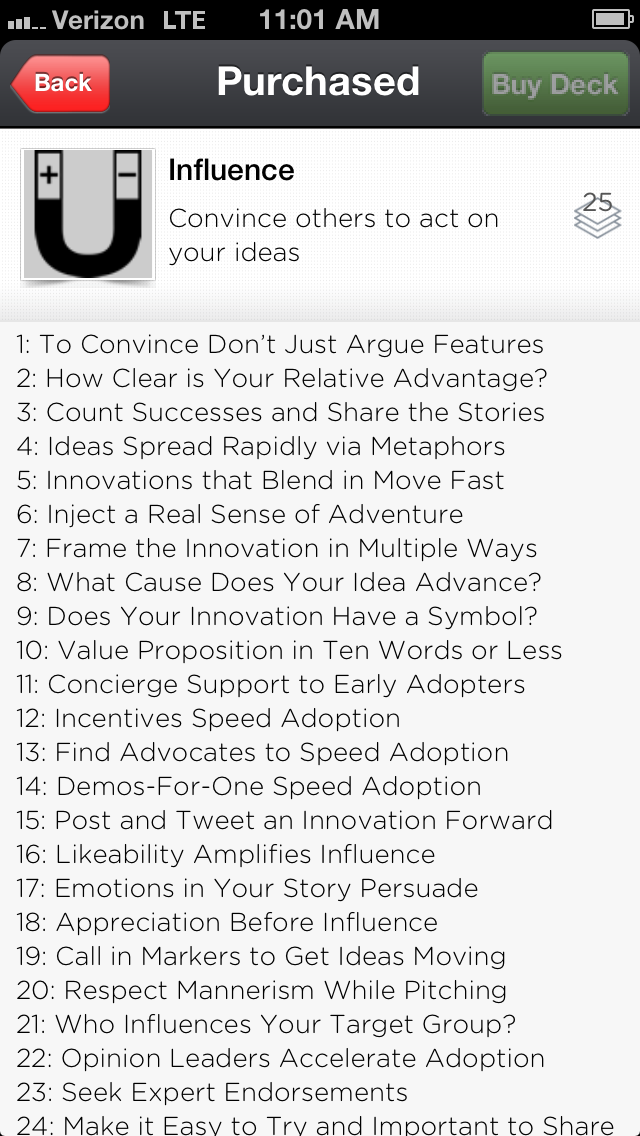Categories: Books, Cognitive Development Tags:
14 Tasty Recipes With Brain Enhancing Ingredients
 The AARP has an excellent article on brain boosting foods. It covers 14 recipes ranging from pecan cranberry and orange muffins to an asparagus, mushroom and ham quiche with a potato crust. You get a full recipe for each dish as well as a brief explanation of the brain enhancing ingredients.
The AARP has an excellent article on brain boosting foods. It covers 14 recipes ranging from pecan cranberry and orange muffins to an asparagus, mushroom and ham quiche with a potato crust. You get a full recipe for each dish as well as a brief explanation of the brain enhancing ingredients.
The information comes directly from the book, ThinkFood: Brain Healthy Recipes. The AARP worked with Posit Science to collect ideas from 50 renown food bloggers. Unfortunately, the book is currently unavailable. I am interested to hear from readers that have a copy and want to share their favorite recipe.
Categories: Books, Cognitive Development, Diet Tags:
Innovators are Influencers
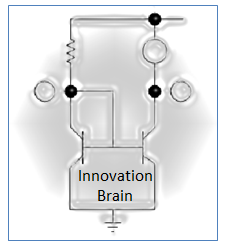 There is a lot of interest in getting better at innovation these days. While much of the focus is on creativity skill, a broader view indicates there are four areas you need to cultivate to build your innovation brain. These include:
There is a lot of interest in getting better at innovation these days. While much of the focus is on creativity skill, a broader view indicates there are four areas you need to cultivate to build your innovation brain. These include:
- Find or energize an innovation calling
- Reframe thinking to go in new directions
- Learn rapidly and deeply from experience
- Influence others to adopt new practices.
Surprisingly, the topic of influence seems to get the least attention. Innovators must convince others to invest time and resources in their raw ideas, persuade early adopters to try out prototypes and spend tremendous energy getting others to change behavior in order to grow a user base. Influence is a key to all phases of innovation.
There are many excellent books on how to get better at positive influence. Two of my favorites are the Influencer now in a second edition and How to Get People to Do Stuff. The Influencer advocates a focus on vital behaviors and provides a broad framework for crafting influence strategies. Get People to Do Stuff zeros in on the seven sources of motivation and provides very specific suggestions. For example:
“If you use nouns when making a request, rather than verbs – for example: “Be a donor” versus “Donate now” – it results in more people taking action. That’s because nouns invoke group identity.”
A careful read of both books reveals that they are recommending many of the same ideas. Indeed, I recently completed a review of over a dozen of the best books on influence and found they have five common themes and offer 25 best practices. The themes most relevant for innovators include:
- Craft compelling messages and stories
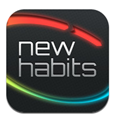
- Provide extra support to early adopters
- Be authentic, likeable & appreciative
- Master the five factors of innovation diffusion
- Leverage opinion leaders and indirect influence.
I’ve documented the 25 best practices as knowledge cards in the NewHabits, a free iPhone and iPad App. You play a card daily to experiment with and eventually master a proven influence technique. Cards are designed to fit into your everyday routine and take minutes to use. Each card is a small-step learning experience that accumulates over time into the habits of highly effective influencers.
An example card and table of contents for the deck is shown below.
Categories: Books, Mental Focus, Problem Solving, Software Tags:
25 Proven Ways to Develop Willpower
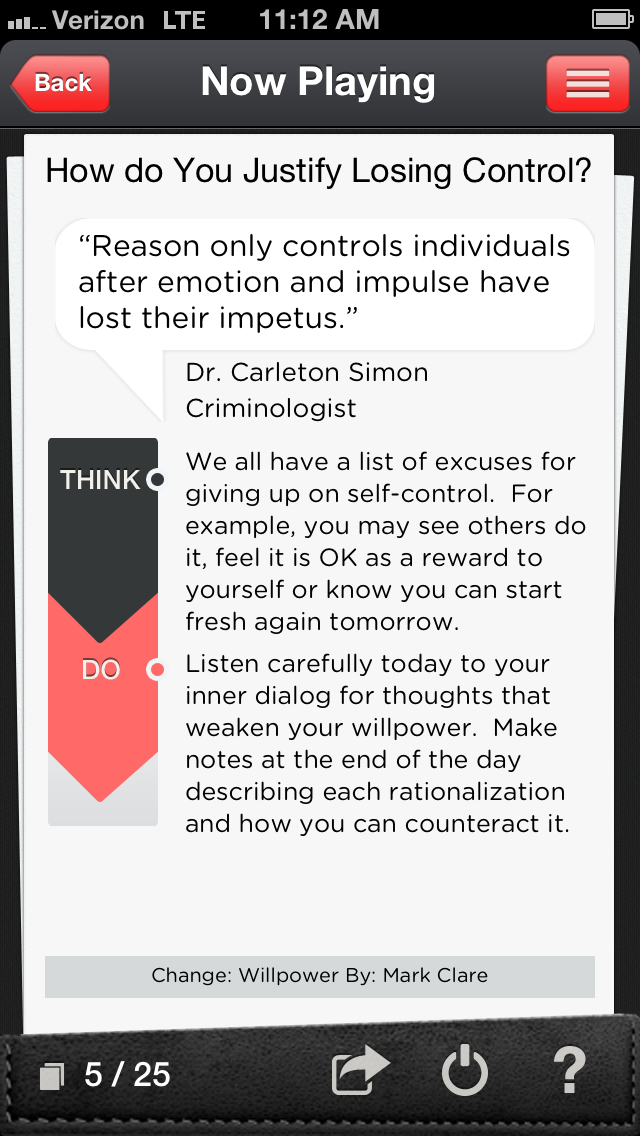 Willpower is the ability to carry out plans and reach goals especially when obstacles challenge us. It is what we use to resist temptation and keep going when we want to stop. Motivation, self-control, determination and grit all rolled up into our force of will.
Willpower is the ability to carry out plans and reach goals especially when obstacles challenge us. It is what we use to resist temptation and keep going when we want to stop. Motivation, self-control, determination and grit all rolled up into our force of will.
The topic of willpower is getting a lot of attention these days. A few examples:
- Akst, D. (2011). We Have Met the Enemy: Self-Control in an Age of Excess
- Baumeister, R. and Tierney, J. (2011). Willpower: Rediscovering the Greatest Human Strength
- McGongal, K. (2011). The Willpower Instinct: How Self-Control Works, Why It Matters, and What You Can Do To Get More of It
Some researchers argue that willpower is like a muscle. If we push too hard we become fatigued and can fail. On the other hand, if we train we can become very strong and develop endurance. But what techniques should we use to train?
To guide my training efforts I have reviewed the research and compiled 25 techniques that are practical enough to use in an everyday setting. To keep things simple I’ve documented each technique on a knowledge card that takes only a few minutes to use. Check out the example card to the right.
You can access the techniques in NewHabits a free iPhone and iPad app. Look in the store for the willpower deck. In the morning I quickly scan the deck and pick a card I want to play. With each play I strengthen my willpower muscle. It is easy to share the cards with friends through email, Facebook or Twitter.
Give the App and try and share your cards with others. I would like to hear from readers about how well the cards work and what other cards should be added.
Categories: Books, Cognitive Development, Mental Focus, Software, Training Tags:
Reading the Classics Lights Up Your Brain
 Interesting new research from Liverpool University claims that Reading Shakespeare has a Dramatic Effect on the Human Brain. Actually they found that reading any classic literature for example Shakespeare, Wordsworth, Elliot, Bard and others causes far more brain activation than the same content translated into plain language. The classic prose demands attention, occasionally stimulates self reflection and builds more mental muscle because the brain works harder.
Interesting new research from Liverpool University claims that Reading Shakespeare has a Dramatic Effect on the Human Brain. Actually they found that reading any classic literature for example Shakespeare, Wordsworth, Elliot, Bard and others causes far more brain activation than the same content translated into plain language. The classic prose demands attention, occasionally stimulates self reflection and builds more mental muscle because the brain works harder.
How does it work? One insight the researchers offer:
“By throwing odd words into seemingly normal sentences, Shakespeare surprises the brain and catches it off guard in a manner that produces a sudden burst of activity – a sense of drama created out of the simplest of things.”
A bit like a magic trick.
I am interested to hear from readers that enjoy the classics. Does the non-standard use of language stimulate your brain in a positive way?
Categories: Books, Cognitive Development Tags:
Using Neuroscience to Optimize the Mature Mind
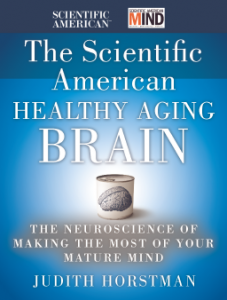 Just finished a good book by Judith Horstman where she explains the neuroscience of making the most of the mature mind. Her findings echo the discussions we have had on the Next Brain Blog. For example, Part three of the book explains in detail how exercise, nutrition, mental stimulation, being social and attitude play a central role in improving cognitive performance as we age.
Just finished a good book by Judith Horstman where she explains the neuroscience of making the most of the mature mind. Her findings echo the discussions we have had on the Next Brain Blog. For example, Part three of the book explains in detail how exercise, nutrition, mental stimulation, being social and attitude play a central role in improving cognitive performance as we age.
She pegs 20-60 years old as the zone of maximum performance for the brain but quickly points out some people peak later in their 70s, 80s and even 90s! She put the central idea of this blog, namely we are responsible for building our next brain, in plain language:
“You built the brain you have today and will continue to refine and remodel it with every action, thought, and feeling and every interaction with people, the experiences, and the environment around you.”
Have you read the book? If so what techniques or insights do think are the most important for building Your Next Brain?
Categories: Books, Cognitive Development, Older Adult Tags:
Can the ABCs Unblock Your Mental Performance?
 Cognitive Behavioral Therapy (CBT) has seen a lot of success over the last 25 years. The ideas is that faulty assumptions or patterns of thinking can seriously impair how we learn, make decisions, socialize or otherwise perform cognitive functions. In CBT the therapist works with the patient to surface the faulty pattern of thinking and change it thereby relieving the problems. The tools of CBT have been incorporated in other disciplines such as leadership, design and self improvement.
Cognitive Behavioral Therapy (CBT) has seen a lot of success over the last 25 years. The ideas is that faulty assumptions or patterns of thinking can seriously impair how we learn, make decisions, socialize or otherwise perform cognitive functions. In CBT the therapist works with the patient to surface the faulty pattern of thinking and change it thereby relieving the problems. The tools of CBT have been incorporated in other disciplines such as leadership, design and self improvement.
As a self-improvement approach the individual attempts to surface and alter faulty assumptions pretty much on their own. While the success of the self-improvement approach has not been scientific demonstrated it does seem to have staying power. More and more books, programs and training events are aimed at how individuals can use CBT to manage their owning thinking and improve cognitive performance. Such programs are typically focused on learning:
- The ABC formula (see diagram) or the connection between activating events, the beliefs they generate and the emotional consequent or feeling we have
- How to analyze self talk especially those messages we repeat
- Ways to identify patterns of dysfunctional thinking (e.g. over generalizing or catastrophizing)
- Techniques for modifying the patterns (e.g. confronting and flooding).
For example you can use this approach to identify and mitigate the negative self-talk that stops you from taking action, making a difficult decision or giving a presentation. To explore CBT further you can work through a short online presentation developed by James Porter or check out CBT for Dummies.
Interested to hear from readers that have used CBT by themselves or with a therapist to improve cognitive performance.
Source: ABC Diagram
Categories: Books, Manage Emotions, Mental Focus, Training Tags:
Use Your Finger to Crank Your Brain
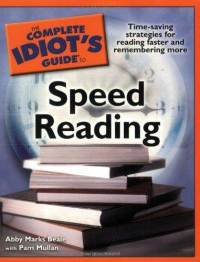 I read faster from paper than I do on a computer screen. With paper I can use my finger to guide my eyes. A well-known speed reading technique, guiding and pacing, lowers the load on your visual system and helps avoid skipping back and other distractions. It is simple and it works. Try it out.
I read faster from paper than I do on a computer screen. With paper I can use my finger to guide my eyes. A well-known speed reading technique, guiding and pacing, lowers the load on your visual system and helps avoid skipping back and other distractions. It is simple and it works. Try it out.
With practice you can drop your finger and still get the effect because your eyes have been retrained. I get some of this effect but am still fastest with good comprehension when I use my finger.
This is just one of the techniques covered in the excellent book, The Complete Idiot’s Guide to Speed Reading.
If you don’t already use these techniques, several weeks of practice will produce a big jump in you reading speed and will likely improve comprehension as well.
Reading speed is important. The difference between a slow reader and an excellent reader means 3 books per week if you read an hour a day.
Very interested to hear from readers that have simple techniques (e.g. use of your finger) to crank your reading speed or other cognitive performances.
Categories: Books, Memory and Learning, Mental Focus, Perception, Training Tags: processing speed, speed reading
Mental Training Techniques of Top Athletes
Top athletes are not only physically fit but also mentally fit. They use mental training routines just as they use physical training routines. Fortunately, many if not all of their mental training routines can be used to improve brain function or enhance cognitive performance in non-sports related contexts.
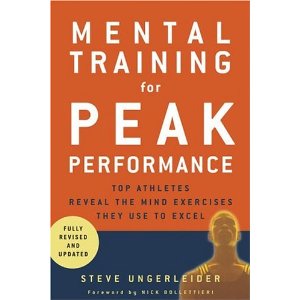 A great resource for exploring these techniques is Steven Ungerleider’s book, Mental Training for Peak Performance. He offers an introduction to mental training and then covers specific techniques including affirmations, self-talk, breathing, mediation, mental snapshots, guided-imagery, visual rehearsal and even dreams. We have covered many of these techniques in the Next Brain blog, but Dr. Ungerleider brings refinements and deeper insights to nearly all of them.
A great resource for exploring these techniques is Steven Ungerleider’s book, Mental Training for Peak Performance. He offers an introduction to mental training and then covers specific techniques including affirmations, self-talk, breathing, mediation, mental snapshots, guided-imagery, visual rehearsal and even dreams. We have covered many of these techniques in the Next Brain blog, but Dr. Ungerleider brings refinements and deeper insights to nearly all of them.
Take for example the use of guided-imagery. This is a technique involves forming vivid mental images and controlling them to practice “in your head” and manage anxiety and performance stress. Ungerleider’s approach stresses understanding how the individual experiences the image – sight, hearing, touch and feel. Other approaches I’ve seen assume we experience images with sight only. He has even developed a Sport Imagery Questionnaire (pgs. 56-57) to help you figure out how you experience images. You assess yourself in four different situations – practicing alone, with others, watching a teammate and competing – and rate how you experience images (1-5) in terms visual (what you saw), auditory (what you heard), kinesthetic (what you felt) and mood (how you felt). You use the results to customize routines for generating and controlling vivid imagery.
I completed the questionnaire and was surprised to find that mood played a key role in how I experience mental imagery. I used this to change my approach to guided-imagery with some good results.
Interested to hear from readers about their experience using the mental training techniques inspired by sports.
Categories: Books, Manage Emotions, Memory and Learning, Mental Focus, Perception, Training Tags: sports
Mental Fitness Cards that Really Work
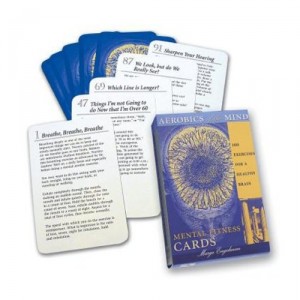 Couple of years ago I bought a pack of Mental Fitness Cards and started to experiment with them. You get 100 cards that provide very specific activities designed to maintain or even enhance the senses, memory, problem solving, linguistic abilities and numeracy. The cards come in a nice sturdy box and include a booklet that provides an overview and suggestions for how to use the cards.
Couple of years ago I bought a pack of Mental Fitness Cards and started to experiment with them. You get 100 cards that provide very specific activities designed to maintain or even enhance the senses, memory, problem solving, linguistic abilities and numeracy. The cards come in a nice sturdy box and include a booklet that provides an overview and suggestions for how to use the cards.
The cards are geared for seniors but I have found 12 that appear to be very useful in general.
One of my favorites is #91 Sharpen Your Hearing. The activity involves turning the volume down on your TV or talk radio show until you can hear but no longer make out what is being said. You then slowly turn it up until you can just barely but clearly hear what is being said. When you repeat this you should not have to turn it up as much to get words because you are learning to focus your hearing. The card talks about drawing lines a on sheet of paper to measure progress. I did not track with that but do it in the car where my radio gives me a number for the volume setting. This way I can measure progress exactly. I am not recommending that you do this in the car.
I am interested to hear from readers about other card-based mental fitness products and how they are using them.
Categories: Books, Cognitive Decline, Memory and Learning, Older Adult, Perception Tags:

